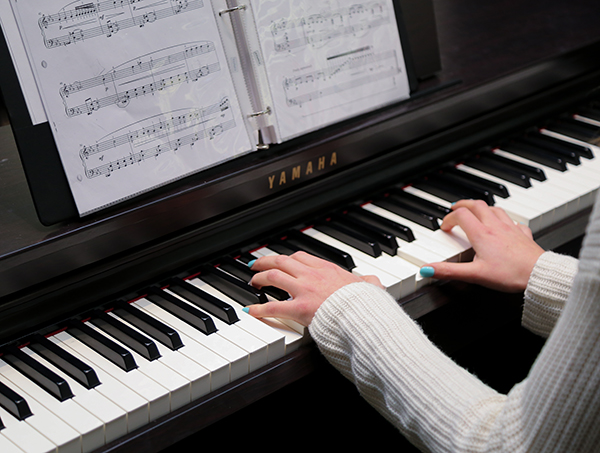Hitting all the right notes
December 3, 2019
Share

The weekly piano lesson, with no meaningful communication with the teacher between lessons, may soon be a thing of the past thanks to a new digital tool unveiled at the Faculty of Education at Queen’s University.
The Cadenza practice app, developed by Queen’s researchers in collaboration with researchers at Concordia and community partners, is a digital tool created to support music learning in studios, ensembles, and classrooms. The app incorporates several unique tools designed to help motivate music students to keep up with their studies, including a digital planner, online lesson assignments, an interactive notebook and a media annotation feedback tool.
Using the online tool, teachers and students can collaboratively plan each practice week and assign homework. Students can track their progress throughout the week, and parents can check their child’s progress.
The idea behind Cadenza was to develop a digital app to support students between lessons, motivating students to practice during the week and to stick with their musical studies. The research team was established over a decade ago and large-scale studies involving close to 20,000 participants were undertaken to see what students, teachers, and parents most needed. Smaller scale studies were also carried out where music studio teachers and their students were interviewed and followed for a number of years. Teacher and student advisors were also involved in developing the app and interpreting research results.
The project, which represents a great example of research translated to social innovation, received funding from the Social Sciences and Humanities Research Council of Canada and the Canada Foundation for Innovation. The project also includes partners in Canada, Ireland and the United Kingdom, with the goal of encouraging individual studio teachers and classroom music teachers to use Cadenza.
“What a privilege to see research turned into practice. There’s nothing more fulfilling than to see a young student using Cadenza, growing in musical skills and blossoming as a musician. After all, it’s not about falling in love with an app — it’s about falling in love with music,” says Rena Upitis, professor of Education at Queen’s and principal investigator on the project
The app makes it fast and efficient for teachers to plan lessons, assign homework, and provide feedback between lessons. The software also includes an annotation feature where students or teachers can add a written comment to a recorded video clip. Students are encouraged to reflect on their practice session and parents can check on their child’s progress.
“Knowledge mobilization programs are not limited to the traditional STEM disciplines,” says Kimberly Woodhouse, Vice-Principal (Research). “The Cadenza Community Project is an outstanding example of an important social innovation initiative based on pedagogical research. Queen’s is pleased to have support this important project. Congratulations to the Cadenza Community team members on the formal launch of this project.”
Incubating within the Faculty of Education, the Cadenza Community Project recently celebrated the formal launch at a reception held at Duncan McArthur Hall on December 2. Now that the app is formally launched, the Cadenza team is seeking partnerships with music schools and organizations to identify teams of teacher users. Meanwhile, anyone can access the app at cadenzapracticeapp.com.